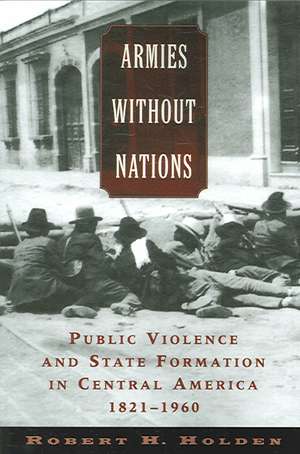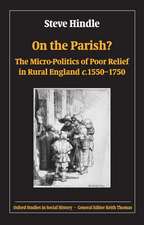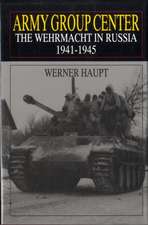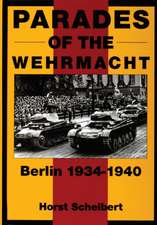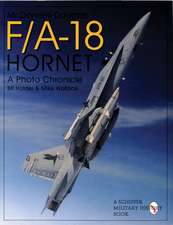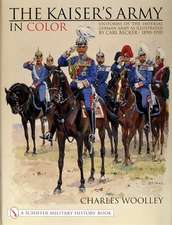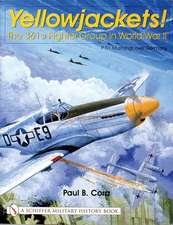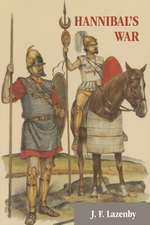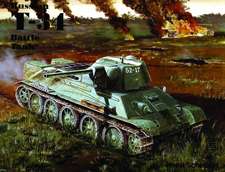Armies without Nations: Public Violence and State Formation in Central America, 1821-1960
Autor Robert H. Holdenen Limba Engleză Paperback – 24 oct 2011
Preț: 348.52 lei
Preț vechi: 379.91 lei
-8% Nou
Puncte Express: 523
Preț estimativ în valută:
66.72€ • 69.45$ • 54.93£
66.72€ • 69.45$ • 54.93£
Carte tipărită la comandă
Livrare economică 20-27 ianuarie 25
Preluare comenzi: 021 569.72.76
Specificații
ISBN-13: 9780195310207
ISBN-10: 0195310209
Pagini: 352
Ilustrații: 14 illus.
Dimensiuni: 229 x 152 x 20 mm
Greutate: 0.52 kg
Editura: Oxford University Press
Colecția OUP USA
Locul publicării:New York, United States
ISBN-10: 0195310209
Pagini: 352
Ilustrații: 14 illus.
Dimensiuni: 229 x 152 x 20 mm
Greutate: 0.52 kg
Editura: Oxford University Press
Colecția OUP USA
Locul publicării:New York, United States
Recenzii
Holden's clear prose and steady argumentation mean that all reading levels will find reward in some portion of the book.
Armies without Nations builds an integrated, regional history and provides a crucial conceptual framework through which to understand how individuals and groups within these particular and emerging nations chose to employ similar tools and methods of social control to assure political power.
I know of no other work that explains so well the intimate relationship of the United States military establishment to the development of Central American military and police states in the mid-twentieth century. In its attention to all five of the Central American states, it also offers a valuable comparative analysis of public violence and policy in this region.
Theoretically informed and heavily documented with archival sources from both the United States and Central America, Holden's work is a major contribution to our understanding of the military and political history of the twentieth-century Central America.
Based on extensive archival research in the United States and Central America, Robert Holden's Armies without Nations explores the history of state formation, public violence, and the role of United States' policy in Central America before the Cuban Revolution. Original theoretical contributions on the sources and agents of violence and careful case studies of Guatemala, El Salvador, Honduras, Nicaragua and Costa Rica from independence to 1961 make this book an important contribution to our understanding of the political and social history of Central America.
For the first time Central America's awesome capacity for fratricidal violence is accorded the status it deserves: the riddle to be solved and not some deviant version of an otherwise progressive history of development. This story began long before what Holden calls the post-World War II era of globalized public violence, and FDR's Good Neighborly military advisors share in the credit so proudly claimed by Reagan-era zealots from North and Poindexter to Abrams and Negroponte."-Lowell Gudmundson, co-author of Central America, 1821-1871
Contrary to much of the scholarly literature of the 1980s, which sought causes for Central American violence in U.S. policy, and contrary also to the official U.S. government view at the time, which blamed Soviet or Cuban meddling, Holden argues that the prevalence of public violence in the region is a product of its own history and not of intervention by external actors....Scholars interested in militarism and violence in public life in Latin America, and especially in Central America, will want to read and discuss this book.
Armies without Nations builds an integrated, regional history and provides a crucial conceptual framework through which to understand how individuals and groups within these particular and emerging nations chose to employ similar tools and methods of social control to assure political power.
I know of no other work that explains so well the intimate relationship of the United States military establishment to the development of Central American military and police states in the mid-twentieth century. In its attention to all five of the Central American states, it also offers a valuable comparative analysis of public violence and policy in this region.
Theoretically informed and heavily documented with archival sources from both the United States and Central America, Holden's work is a major contribution to our understanding of the military and political history of the twentieth-century Central America.
Based on extensive archival research in the United States and Central America, Robert Holden's Armies without Nations explores the history of state formation, public violence, and the role of United States' policy in Central America before the Cuban Revolution. Original theoretical contributions on the sources and agents of violence and careful case studies of Guatemala, El Salvador, Honduras, Nicaragua and Costa Rica from independence to 1961 make this book an important contribution to our understanding of the political and social history of Central America.
For the first time Central America's awesome capacity for fratricidal violence is accorded the status it deserves: the riddle to be solved and not some deviant version of an otherwise progressive history of development. This story began long before what Holden calls the post-World War II era of globalized public violence, and FDR's Good Neighborly military advisors share in the credit so proudly claimed by Reagan-era zealots from North and Poindexter to Abrams and Negroponte."-Lowell Gudmundson, co-author of Central America, 1821-1871
Contrary to much of the scholarly literature of the 1980s, which sought causes for Central American violence in U.S. policy, and contrary also to the official U.S. government view at the time, which blamed Soviet or Cuban meddling, Holden argues that the prevalence of public violence in the region is a product of its own history and not of intervention by external actors....Scholars interested in militarism and violence in public life in Latin America, and especially in Central America, will want to read and discuss this book.
Notă biografică
Robert H. Holden is an Associate Professor of History at Old Dominion University. He is the author of Mexico and the Survey of the Public Lands: The Management of Modernization, 1876-1911 and the co-editor of Latin America and the United States: A Documentary History (OUP, 2000).
